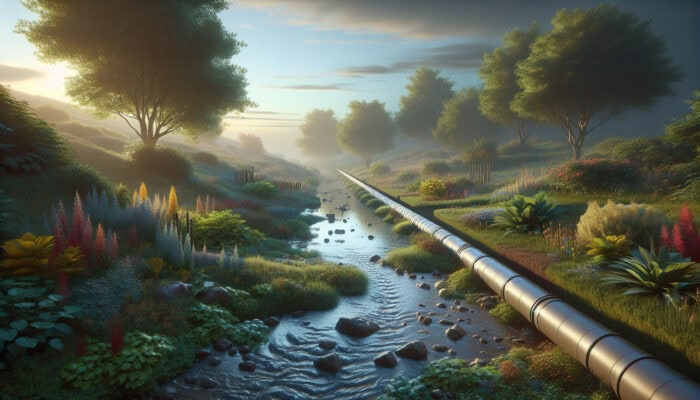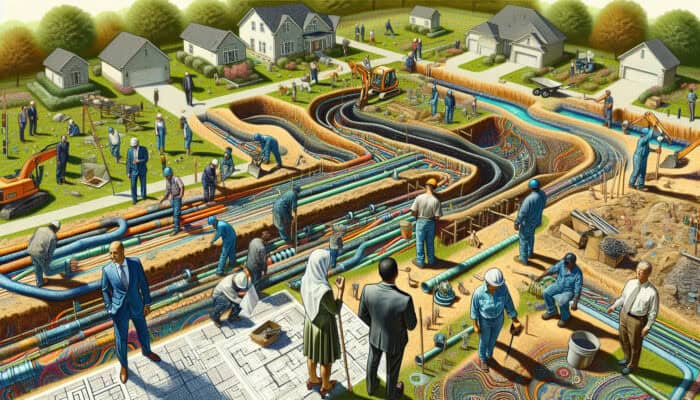Comprehensive Strategies for Effective Landscape Drainage Solutions
What is Landscape Drainage and Why is it Essential for Protecting Your Property?

Landscape drainage is a vital aspect of property management, focused on the effective handling of excess water to safeguard homes and landscapes from the detrimental impacts of flooding and erosion. This process employs a variety of systems, including French drains, surface grading, and swales, designed specifically to redirect water away from vulnerable areas. The primary aim is to sustain the health and functionality of landscapes, thus avoiding typical drainage issues faced by homeowners, such as:
- Water pooling in yards and gardens.
- Basement flooding leading to costly repairs.
- Soil erosion compromising structure and aesthetics.
- Inadequate water flow away from foundations, risking structural integrity.
- Driveway washouts causing access issues.
- Mould and mildew growth from excess moisture.
- Deterioration of plant and lawn health due to unsatisfactory drainage.
For homeowners, understanding the intricacies of landscape drainage is crucial, particularly in regions like the West End of Vancouver, where heavy and frequent rainfall can pose significant challenges.
Why is Proper Drainage Critical for the Structural Integrity of Your Property?
The significance of having a proper drainage system installed cannot be overstated. Firstly, it is essential in preventing soil erosion, which not only affects the visual appeal of your landscape but also threatens the stability of buildings. When water flow is uncontrolled, it can undermine foundations, leading to expensive repair bills in the future. Furthermore, a well-functioning drainage system ensures that plants receive the correct balance of moisture, preventing over-saturation. This equilibrium is vital for both residential and commercial properties as it preserves visual attractiveness and safeguards property value.
Moreover, effective drainage systems mitigate health risks linked to stagnant water, which can foster insect infestations and mould growth. By investing in high-quality drainage solutions, homeowners can create a safer living environment while simultaneously boosting the value and aesthetics of their properties.
What Are the Major Advantages of Professional Drainage System Installation?
Choosing to have drainage systems professionally installed offers a plethora of benefits. Professionals possess the expertise to ensure that drainage solutions are meticulously tailored and executed according to the specific conditions of each property. This includes critical considerations such as soil type, topography, and existing infrastructure. Such a bespoke approach significantly enhances the effectiveness and longevity of drainage systems.
Additionally, hiring professionals for your drainage installation can yield long-term financial savings for homeowners. By proactively addressing potential drainage concerns, the risk of incurring expensive repairs related to water damage is substantially diminished. Many professionals also provide warranties on their work, giving homeowners peace of mind that their drainage system will function effectively for years to come.
In-Depth Review of Landscape Drainage Services in West End, Vancouver

What Unique Challenges Does the West End Present for Efficient Drainage Solutions?
The West End of Vancouver is characterised by its densely populated urban environment and unique geographical features, including its proximity to the coast and surrounding hills. These elements present specific challenges in terms of landscape drainage. The region experiences high levels of rainfall, necessitating drainage solutions capable of managing sudden and intense downpours, especially during the rainy season.
Local experts have successfully implemented various strategies, such as French drains and permeable paving, to address these drainage challenges across multiple properties. A notable instance involved a residential project where French drains were installed to divert water away from a basement that frequently suffered from flooding. This intervention not only protected the home but also improved the overall landscape, resulting in healthier garden beds that thrived without the risk of being waterlogged.
How Can You Identify the Most Suitable Drainage System for Your Property?
Choosing the right drainage system for your property is a crucial decision influenced by several factors, including soil type, topography, and prevailing water flow patterns. In the West End, where clay soils are prevalent, it may be necessary to implement systems that enhance drainage efficiency, such as French drains or dry wells.
For properties that feature significant slopes, surface grading can effectively redirect water away from the foundation, thus reducing the risk of water-related damage. Homeowners should also consider existing structures or landscaping elements that may impact drainage patterns. Consulting with a local drainage professional can provide bespoke recommendations tailored to address the specific drainage challenges common in the area.
What are the Key Steps in the Installation Process of Drainage Systems?

The installation of landscape drainage systems involves several critical steps. Initially, a comprehensive site assessment is performed to evaluate current conditions and identify problematic areas. Following this assessment, a drainage system is designed, taking into account the unique characteristics of the property and the most effective solutions to address specific drainage challenges.
Once the design is finalised, the implementation phase begins, which may involve excavation for trenching, the installation of appropriate drainage materials, and ensuring accurate grading. Homeowners are encouraged to remain actively involved throughout the process, asking questions and providing input to ensure that the final system aligns with their expectations. By understanding each step of the installation, homeowners can effectively prepare their property for a seamless process.
Identifying Common Drainage Problems in West End, Vancouver
What Factors Contribute to Poor Drainage Conditions?
Poor drainage in the West End can arise from various factors, including heavy rainfall, soil compaction, and improper grading practices. In urban areas where impervious surfaces like asphalt and concrete dominate, water often struggles to flow naturally, leading to pooling and flooding scenarios. Furthermore, soil compaction frequently occurs due to foot traffic or heavy machinery, which further inhibits the ground’s capacity to absorb water.
Inadequate grading can exacerbate drainage issues, causing water to flow towards, rather than away from, structures and increasing the likelihood of water-related complications. Recognising these underlying causes is essential for effectively addressing drainage problems and implementing suitable solutions tailored to the unique conditions of properties in the West End.
What Signs Should You Look Out For That Indicate Drainage Issues?
Early identification of drainage problems can avert significant damage to properties. Common indicators that suggest drainage issues include:
- Water pooling in various areas of the yard.
- Constantly soggy ground that fails to dry.
- Basement or crawl space flooding during heavy rains.
- Cracks developing in foundation walls.
- Mould or mildew growth within or around the property.
- Unusual plant growth patterns, with some areas flourishing while others decline.
- Water stains appearing on walls or floors.
Being attentive to these signs allows homeowners to address drainage concerns promptly, preventing them from escalating into costly repairs.
What Solutions Are Available to Address Specific Drainage Problems?
Effectively addressing drainage issues requires tailored solutions based on the specific problems encountered. For instance, if water pooling occurs due to poor grading, simple adjustments to the landscape’s slope may suffice to resolve the situation. In more intricate cases, such as chronic basement flooding, a comprehensive drainage system may be necessary to rectify ongoing issues.
In scenarios involving severely compacted soils, aeration techniques can significantly enhance water absorption capabilities. Additionally, the installation of catch basins or perforated pipes can facilitate better water management in areas prone to excess moisture. Customising solutions to fit the unique challenges of each property guarantees effective drainage and long-term viability.
How Does Poor Drainage Affect Property Value?
The implications of poor drainage extend beyond immediate inconvenience; they can drastically impact property value. Properties with unresolved drainage issues tend to depreciate due to the risk of water damage, structural complications, and potential for costly repairs. Homebuyers are increasingly aware of the necessity of reliable drainage systems and may hesitate to invest in properties exhibiting signs of water-related difficulties.
On the flip side, proactively addressing drainage concerns can enhance property value, demonstrating responsible maintenance and care. Well-managed drainage systems contribute not just to the structural integrity of homes but also to their overall aesthetic appeal, making them more appealing to potential buyers.
Essential Maintenance Practices for Your Drainage System
What Regular Maintenance Tasks Should You Incorporate into Your Routine?
Regular maintenance of your drainage system is crucial for ensuring its longevity and effectiveness. Essential maintenance tasks include:
- Cleaning gutters and downspouts to prevent clogs that impede water flow.
- Inspecting drainage systems for signs of wear, damage, or blockage.
- Ensuring proper water flow around the property to prevent pooling.
- Checking for sediment buildup in drainage areas that can obstruct flow.
- Monitoring plant health, as overly moist areas may indicate drainage issues.
- Trimming vegetation surrounding drainage systems to prevent obstruction.
- Periodically evaluating the condition of drainage materials to ensure optimal performance.
By incorporating these maintenance tasks into a regular schedule, homeowners can avert major drainage issues and prolong the lifespan of their systems.
When Should You Seek Professional Assistance for Drainage Issues?
Homeowners should consider contacting a professional drainage service when they observe persistent pooling of water, unusual odours, or signs of system failure, such as water backup. If there are uncertainties regarding the upkeep of the drainage system or if issues persist despite maintenance efforts, seeking expert intervention becomes vital.
Professional services provide comprehensive assessments and can recommend effective solutions to restore proper drainage, preventing further complications. Recognising when to seek assistance can save both time and resources in the long term.
What Are the Financial Implications of Maintaining Your Drainage System?
The costs associated with maintaining a drainage system can vary considerably based on several factors, including the complexity of the system, the frequency of service, and its geographical location. Homeowners should budget for routine inspections, cleaning, and potential repairs to ensure system functionality.
Typically, routine maintenance costs can range from a few hundred pounds annually to more significant expenses for complex systems that necessitate frequent professional intervention. Understanding these costs allows homeowners to integrate them into their overall property management budget, ensuring that drainage systems remain operational and effective.
Research-Backed Advantages of Landscape Drainage Services in West End, Vancouver
How Can Efficient Drainage Systems Enhance Property Value?
Implementing effective drainage systems can substantially boost property value by preventing water damage and promoting landscape health. For instance, properties featuring advanced drainage solutions, such as permeable pavers or green roofs, have witnessed market value increases due to their reduced risk of flooding and enhanced overall visual appeal.
Furthermore, homeowners in the West End have reported successful property sales after tackling drainage issues, as potential buyers appreciate well-maintained landscapes that indicate lower future maintenance costs. Investing in proper drainage not only secures the property but also serves as an attractive selling point in real estate listings.
What Environmental Benefits Do Effective Drainage Solutions Provide?
Proper drainage systems offer significant environmental advantages by minimising runoff and preventing soil erosion. When water is managed effectively, it reduces the risk of pollutants entering local waterways, thereby fostering a healthier ecosystem. Additionally, well-designed drainage solutions can enhance groundwater recharge by allowing water to infiltrate the soil rather than running off.
In urban areas like the West End, adopting sustainable drainage practices can mitigate flooding while strengthening the resilience of the natural landscape. By supporting local ecology through effective drainage, homeowners contribute positively to both the environment and their community.
What Do Recent Studies Reveal About Drainage Efficiency?
Research indicates that well-designed drainage systems significantly reduce water-related problems, enhancing both property value and the usability of outdoor spaces. Studies have shown that properties equipped with effective drainage solutions experience fewer instances of flooding and water damage, thereby lowering long-term maintenance costs.
Experts consistently advocate for customised drainage strategies that take local climate and soil conditions into account, as these factors are crucial for maximising efficiency. Analysing recent research highlights the importance of investing in high-quality drainage solutions, especially in regions prone to heavy rainfall, such as the West End.
How Can Proper Drainage Improve Outdoor Living Areas?
Effective drainage is essential for enhancing outdoor living spaces. By preventing waterlogging, homeowners can create functional patios, gardens, and recreational areas that remain usable throughout the year. Well-drained landscapes provide an ideal foundation for outdoor furniture, barbecues, and social gatherings, ensuring these areas stay inviting.
Additionally, proper drainage promotes healthy plant growth, allowing landscaping efforts to flourish without the risk of over-saturation. Homeowners can maximise their enjoyment of outdoor spaces while simultaneously increasing property value through thoughtfully designed drainage solutions.
What Long-Term Financial Benefits Can Result from Investing in Drainage Solutions?
Investing in high-quality drainage solutions yields substantial long-term financial benefits. By implementing effective systems, homeowners can reduce the risks associated with water damage, which can lead to significant financial setbacks. Proper drainage diminishes the likelihood of costly repairs linked to flooding, foundation issues, and mould remediation.
Moreover, maintaining an efficient drainage system can enhance overall property value, resulting in a better return on investment over time. For homeowners in the West End, this means that adopting a proactive approach to drainage not only secures their property but also represents a sound financial strategy.
Selecting the Most Reliable Landscape Drainage Service Provider
What Key Characteristics Should You Look for in a Drainage Company?
When searching for a drainage service provider, it is crucial to consider several key characteristics. Seek companies that demonstrate:
- Proven experience and expertise in landscape drainage solutions.
- Relevant certifications and licenses to affirm their credibility.
- A robust reputation within the local community.
- Comprehensive service offerings to address various drainage challenges.
- Transparent pricing with detailed estimates to avoid hidden costs.
- Positive customer testimonials and references as indicators of reliability.
- A commitment to sustainable practices and eco-friendly solutions.
These qualities signify a trustworthy provider capable of delivering effective drainage solutions tailored to your property’s distinct needs.
How Can You Evaluate a Company’s Past Performance?
Assessing a drainage company’s previous work is vital for making informed decisions. Start by checking references and requesting testimonials from former clients. Furthermore, viewing before-and-after images of completed projects can offer valuable insights into the quality and effectiveness of their work.
Understanding the scope of prior projects will help ascertain whether the company has experience with situations comparable to yours. This thorough evaluation process ensures that homeowners select a provider with a proven track record of success in landscape drainage.
What Essential Questions Should You Pose Before Hiring a Drainage Service?
Before hiring a drainage service provider, asking the right questions can clarify expectations and ensure a suitable fit. Inquire about their experience with local drainage issues, the specific methods they employ, and any warranties they provide on their work.
Moreover, request detailed cost estimates and timelines for project completion. Clear communication regarding strategies, materials, and maintenance practices can foster a collaborative relationship, ensuring that your drainage needs are effectively addressed.
Emerging Developments in Landscape Drainage
What Innovations Are Shaping the Future of Drainage Solutions?
The field of landscape drainage is rapidly evolving, with various innovations emerging to enhance efficiency and sustainability. Smart drainage systems equipped with sensors can monitor moisture levels and automatically adjust water flow, optimising both performance and resource management.
Additionally, eco-friendly materials and techniques, including green roofs and rain gardens, are gaining popularity. These solutions manage water effectively while positively impacting the environment, making them ideal choices for eco-conscious homeowners. As these trends continue to evolve, they will shape the future of drainage solutions, particularly in urban settings like the West End.
How Will Climate Change Affect Future Drainage Requirements?
Climate change is projected to significantly influence drainage needs in the West End and beyond. Increased rainfall intensity may exacerbate existing drainage challenges, necessitating more robust and resilient systems to manage rising volumes of water.
Understanding these future challenges is vital for both homeowners and drainage professionals. By anticipating changes and investing in advanced solutions, property owners can better prepare for the evolving landscape of water management.
What Role Does Technology Play in Modern Drainage Solutions?
Technology is increasingly crucial in landscape drainage solutions, particularly in the design, monitoring, and maintenance phases. Advanced software facilitates system modelling, enabling individuals to predict potential issues and develop effective solutions.
Moreover, smart technologies allow for real-time monitoring of drainage systems, alerting homeowners to potential failures or blockages before they escalate into costly problems. The integration of technology into drainage solutions enhances overall effectiveness and efficiency, greatly benefiting homeowners in the West End.
How Will Urbanisation Impact Future Drainage Requirements?
As urbanisation continues to expand in the West End, the demand for innovative drainage solutions intensifies. The prevalence of impermeable surfaces, such as roads and buildings, can generate higher runoff volumes, elevating the risk of flooding in urban environments.
To address these challenges, developers and homeowners must explore sustainable drainage practices that effectively manage increased water flow. Implementing strategies such as permeable paving and green infrastructure will be essential to maintaining a balanced urban ecosystem while mitigating flooding.
Frequently Asked Questions About Landscape Drainage Solutions
What Are the Common Indicators of Drainage Issues?
Common indicators include water pooling, soggy ground, basement flooding, and mould growth. Identifying these early signs can help prevent significant damage to your property.
How Often Should I Perform Maintenance on My Drainage System?
Regular maintenance is recommended at least once a year, though more frequent checks may be necessary in areas with heavy rainfall or following severe weather events.
What is the Typical Cost of Installing a Drainage System?
The cost of drainage installation can vary significantly based on system complexity and property size, typically ranging from a few thousand to tens of thousands of pounds.
Can I Install Drainage Systems Myself?
While some homeowners may possess the skills to install basic systems, professional installation is advisable for complex drainage solutions to ensure proper design and effectiveness.
How Can I Prevent Drainage Issues from Arising?
Regular maintenance, proper grading, and investing in effective drainage solutions can significantly help prevent drainage issues from developing over time.
What Types of Drainage Systems Are Best Suited for Clay Soil?
French drains and dry wells are often ideal for clay soils, as they assist in redirecting excess water away from problematic areas.
Do Drainage Systems Require Permits in Vancouver?
Yes, certain drainage installations may require permits. It is essential to consult local authorities before proceeding with any drainage project.
What is the Lifespan of a Typical Drainage System?
With proper maintenance, most drainage systems can last over 10 years; however, some components may need replacement sooner due to wear and tear.
What Should I Do If My Drainage System Becomes Clogged?
If you suspect a clog, inspect the system for visible blockages and clear them if it is safe to do so. Otherwise, consult a professional for assistance to ensure proper resolution of the issue.
Are Eco-Friendly Drainage Solutions Available?
Yes, there are numerous eco-friendly drainage solutions, such as rain gardens and permeable pavers, designed to manage water sustainably while benefiting the environment.
Connect with us on Facebook!
Presented By: Landscape Drainage in West End Vancouver
The Article: Landscape Drainage Services in West End Vancouver: Your Solution First Published On: https://pacificbluemechanical.ca/
The Article Landscape Drainage Services: Your Solution in West End Vancouver Was Found On https://limitsofstrategy.com

